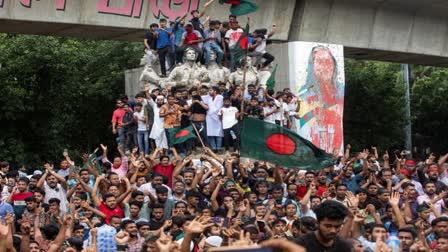Thiruvananthapuram:The developments in Bangladesh over the past one week have shocked many. Sheikh Hasina, who served as Prime Minister for 15 years, was suddenly depicted as a dictator and fascist, and exiled. However, the exact circumstances of these events still remain unclear. Dr TP Srinivasan, a former Indian Ambassador to the United States and a leading diplomatic expert has assessed the situation in Bangladesh.
According to Dr Srinivasan, until a week ago, there were no significant issues. "Some controversies surrounded Sheikh Hasina's administration, particularly concerning the use of stringent laws, but her leadership had contributed to rapid development, at one point even surpassing India in some aspects. Although her governance was effective, she faced opposition from various quarters," he said.
Hasina had kept her rival and former Prime Minister, Begum Khaleda Zia, in jail for years. Recently, student protests erupted over reservation policies related to the Bangladesh Liberation Movement. However, after judicial intervention resolved the issue, the situation deteriorated rapidly. The reasons behind this sudden shift, however, remain uncertain, Dr Srinivasan said.
Is the Sino-Pakistani Axis Involved?
The former Indian Ambassador US said that there is a speculation that China might be involved in these developments. Sheikh Hasina had visited China shortly before these events, but her reception had been unusually cold and unceremonious. This odd treatment has fueled suspicions of China's involvement, he said. "Also, China is known to consult Pakistan before formulating its policies on Southeast Asian countries, adding to doubts about its role in the current situation in Bangladesh. The student protests quickly turned violent, escalating to the point of fatalities," he added.
"It is believed that Sheikh Hasina resigned and left the country, possibly at the behest of the Bangladesh Army. She and her associates reportedly reached India by helicopter and are now in Delhi. It remains unclear how long they will stay in India. An interim government has been formed under the leadership of Muhammad Yunus, a Nobel laureate. Yunus was awarded the Nobel Peace Prize in 2006 for his efforts in empowering women through the Grameen Bank. Due to previous disagreements, Hasina had excluded Yunus from political affairs, though there was sentiment that he should enter politics. Yunus has now assembled a cabinet to address this demand," Dr Srinivasan said.
